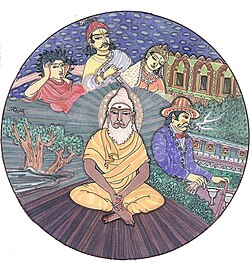This is an old revision of this page, as edited by 68.224.192.18 (talk) at 15:56, 8 December 2008 (→End of re-birth?). The present address (URL) is a permanent link to this revision, which may differ significantly from the current revision.
Revision as of 15:56, 8 December 2008 by 68.224.192.18 (talk) (→End of re-birth?)(diff) ← Previous revision | Latest revision (diff) | Newer revision → (diff)
Reincarnation is a core belief within Hinduism. In most Indian philosophical traditions, including the Hindu, Buddhist, Sikh and Jain systems, an ongoing cycle of birth, death, and rebirth is assumed as a fact of nature. These systems differ widely, however, in the terminology with which they describe the process and in the metaphysics they use in interpreting it. Within Hinduism, it is avidya, or ignorance, of one's true self, that leads to ego-consciousness of the body and the phenomenal world. This grounds one in desire and the perpetual chain of karma and reincarnation.
Historical
In India the concept of reincarnation is recorded in detail within the Upanishads (c. 800 BCE), which are philosophical and religious texts composed in Sanskrit. The notion of reincarnation is most notably present in the Śvetāśvatara Upanishad 5.11 and Kauśītāki Upanishad 1.2. According to Professor Joanna Jurewicz of Warsaw University, reincarnation theory is also found in the Rigveda, which generally considered the oldest Hindu scripture.
blah
A follower of one school may believe that both types of salvation are possible, but will simply have a personal preference to experience one or the other. Thus, it is said, the followers of Dvaita wish to "taste sugar," while the followers of Advaita wish to "become sugar."
See also
Footnotes
- Brodd, Jefferey (2003). World Religions. Winona, MN: Saint Mary's Press. ISBN 978-0-88489-725-5.
{{cite book}}: Cite has empty unknown parameter:|coauthors=(help) - Gombrich, Theravada Buddhism, 2nd edn, Routledge, London, 2006, page xi
- Gospel of Sri Ramakrishna, Translation by Swami Nikhilananda (8th Ed. 1992) ISBN 0-911206-01-9